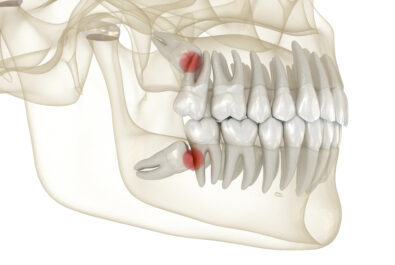Brushing your teeth isn’t the only part of practicing excellent oral hygiene – in fact, flossing is critical to remove bacteria from in between your teeth. When this bacteria (known as plaque) is left between your teeth, it has direct access to your gum tissue. Over time, plaque can harden and become tartar (a much tougher infection-causing bacteria) and then, it’s only a matter of time before tartar begins to form dangerous oral infections. Unfortunately, flossing is often overlooked. But, according to the American Dental Association, you should floss at least once per day – whether it’s before or after you brush – to maintain optimal oral health.
How To Properly Floss Your Teeth
If you’re not properly flossing, you could be harming your gum tissue. To protect your soft tissue, try not to ‘snap’ the floss between your teeth. If you’re having a tough time getting the floss through, wiggle the floss gently back and forth until it moves freely.
If you have orthodontics, flossing around them can be difficult using regular floss. However, there are many different types of floss that you can use to make maneuvering around your mouth easier.
Why Is Preventive Dentistry Important?
Practicing preventive dentistry not only includes your oral hygiene, but visiting your dentist and maintaining a healthy diet. Each of these are critical to maintaining your oral health and preventing any infections, such as gum disease or tooth decay.
We already know why your oral hygiene is important, but what about your dentist visits and your diet? How do those play a part in preventing damage?
Since you typically visit your dentist every 6 months for a checkup and cleaning – they’re able to spot anything abnormal and remove any bacteria around your mouth. When it comes to your diet, the foods and drinks you consume go directly through your mouth. If unhealthy foods (such as sugars or starches) become stuck between your teeth, they could be detrimental to your tooth enamel and lead to an infection as well.
Preventive dentistry – flossing included – is absolutely critical in order to avoid any damage to your teeth, gum tissue, and bone structure.














